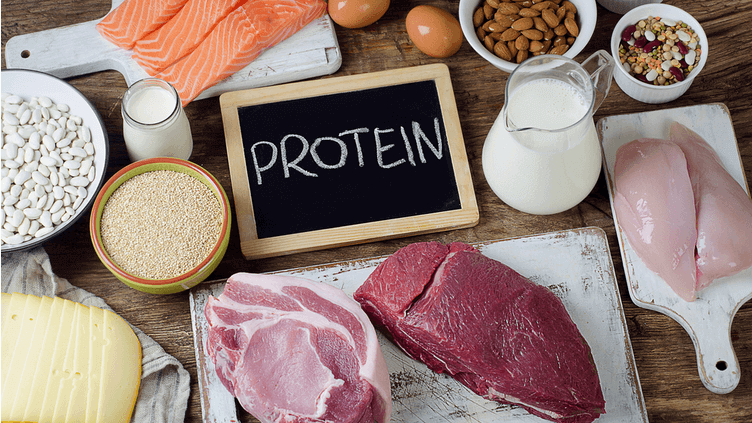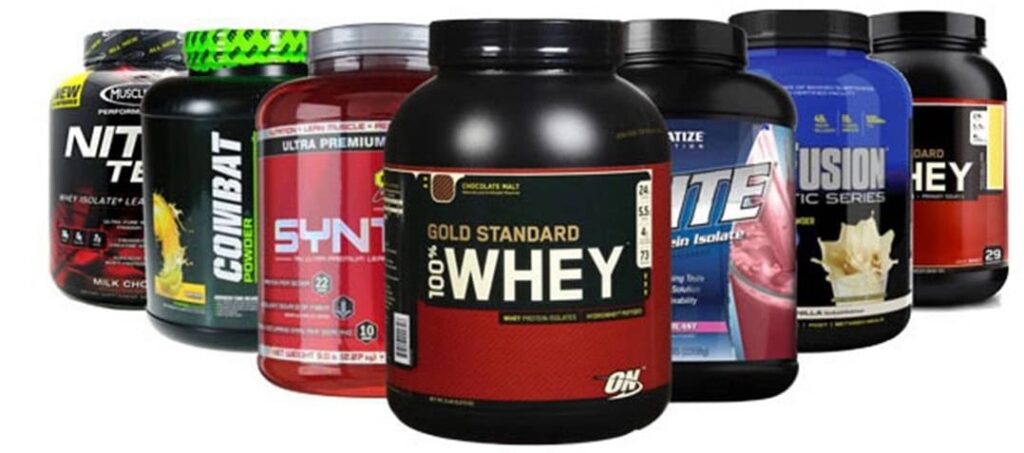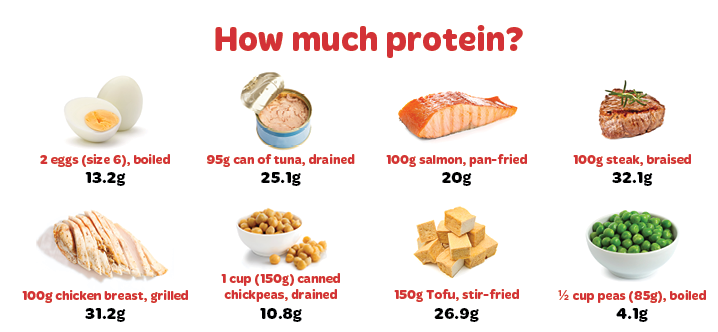Proteins
Protein is a macronutrient that is essential to building muscle mass. It is commonly found in animal products, though is also present in other sources, such as nuts and legumes. There are three macronutrients: protein, fats and carbohydrates. Macronutrients provide calories, or energy. Each gram of protein contains 4 calories. Protein makes up about 15 percent of a person’s body weight. When protein is broken down in the body it helps to fuel muscle mass, which helps metabolism. It also helps the immune system stay strong. It helps you stay full. A lot of research has shown that protein has satiety effects.
Function of Proteins
Proteins play a role in nearly every biological process, and their functions vary widely. The main functions of proteins in the body are to build, strengthen and repair or replace things, such as tissue. Protein is an important building block of bones, muscles, cartilage, skin, and blood. A protein called hemoglobin contain iron atom which temporarily links with oxygen and releases it throughout the body. Proteins also regulate body processes. For example, enzymes are proteins that speed up chemical reactions in the body and hormones, like insulin, are proteins that regulate the activity of cells or organs.

Amino Acids, Complete or Ideal Proteins
Chemically, protein is composed of amino acids, which are organic compounds made of carbon, hydrogen, nitrogen, oxygen or sulfur. Amino acids are the building blocks of proteins, and proteins are the building blocks of muscle mass. People can produce some amino acids, but must get others from food. The nine amino acids that humans cannot produce on our own are called essential amino acids.Essential amino acids are: histidine, isoleucine, leucine, lysine, methionine, phenylalanine, threonine, tryptophan and valine. Protein foods that contain all essential amino acids are called complete proteins. They are also sometimes called ideal proteins or high-quality proteins. Complete proteins include meat and dairy products, quinoa, hemp seeds, chia seeds and soy. Many plant-based proteins are not complete proteins.
These include beans, grains and legumes as well as vegetables, which contain small amounts of protein. Incomplete proteins can be combined to create complete proteins. Beans and rice, peanut butter and whole grain bread, and macaroni and cheese are examples of combinations that create complete proteins. For a long time, nutritionists thought that complementary proteins had to be eaten together to make a complete protein. But it is now understood that the foods don’t have to be eaten at exactly the same time. As long as you eat a wide variety of foods, you can usually make complete proteins, even if you’re a vegetarian.
How much Protein?
It is recommended that 10 to 35 percent of daily calories come from protein. How that equates to grams of protein depends on the caloric needs of the individual. The amount of protein foods a person should eat depends on lean body mass, age, sex, and level of physical activity. A safe level of protein ranges from 0.8 grams of protein per kilogram of body weight (2.2 lbs.), up to 2 grams of protein per kilogram for very active athletes. Most people need 20 to 30 grams of protein per meal.

Natural Sources of Protein & Supplements
All food made from meat, poultry, seafood, beans and peas, eggs, processed soy products, nuts and seeds are considered part of the protein group. Besides animal sources, there are several alternative sources of protein, including soy, hemp and whey. All are good options and it comes down to personal preference.
Protein supplements are one of the most popular dietary supplements used by athletes, recreationally active adults, and soldiers striving to increase muscle mass, improve exercise recovery, and improve performance. Resistance and endurance exercise can induce a net negative protein balance and, if the body is lacking sufficient levels of amino acids (AAs), both pre- and post-exercise, muscle wasting and delayed exercise recovery can occur. When protein intake is too low, maximal strength and lean mass gains cannot be achieved, even with maintenance of a positive nitrogen balance Therefore, many people, and in particular athletes, consume protein supplements to meet the additional demands from training and/or competition. A higher protein intake is advantageous for muscle and strength development and, therefore, bodybuilders and other strength athletes widely use protein supplements to achieve high protein intakes (up to three times the recommended daily allowance).

Whey protein is better for building and regenerating muscle mass, so people looking to bulk up or who exercise a lot may prefer it. Whey protein is a by-product of the cheese-making process and therefore not vegan. It is typically found in supplements, such as protein powders. It is usually used to promote lean muscle mass and is also associated with weight (Fat) loss. There are 20 grams of protein per scoop of whey protein. Hemp protein comes from the hemp plant, which does not have THC (the active ingredient in marijuana). Hemp is available as seeds, a powder and milk. There are 5.3 grams of protein per tablespoon of hemp seeds, about 5 grams per scoop of hemp powder and 5 grams per cup. Soy protein comes from soybeans and is available in many different forms, including milk, tofu, various meat substitutes, flour, oil, tempeh, miso nuts and edamame. Soy has been shown to have a little more phytoestrogens in it from isoflavones, which really helps to increase antioxidants. But a lot of people are hesitant to do so because of a myth that associates it with breast cancer. But that myth has been minimized based off of a large body of evidence that supports the actual anticancer properties that soy has. To get the maximum benefits from soy, eating whole sources, like edamame is recommended. Processed forms like tofu are the next best option, followed by protein powders and drinks.

Protein Deficiency
Proteins are vital to every part of the human body. Protein must be consumed through food, as it is needed by the body for proper functioning and survival. The body cannot store protein long-term for future use, as it does fat, so it requires an adequate protein intake each day.
The main reason of protein deficiency is imbalanced diet. For example, people who follow vegetarian or vegan diets may be at risk of developing a protein deficiency if they are not careful about including enough protein sources in their meals. Low intake of protein may cause: muscle wasting, weakness, muscle and joint pain, greater risk of bone fractures, low blood pressure and low heart rate, fatty liver, swollen or puffy skin (known as edema), hair thinning or hair loss (alopecia), stunted growth in children, brain fog (not able to think clearly) and Impaired immune system and more severe infections.

Dr Saranjeet Singh
Fitness & Sports Medicine Specialist
Lucknow








Most of what you point out happens to be astonishingly legitimate and it makes me wonder the reason why I hadn’t looked at this with this light previously. This article really did turn the light on for me as far as this particular topic goes. However there is 1 point I am not really too comfortable with and whilst I make an effort to reconcile that with the core idea of the issue, allow me observe what the rest of your visitors have to point out.Very well done.
A very good article highlighting the importance of Protein in our daily diet which is often found lacking in our traditional Indian food.
Thank you for sharing excellent informations. Your site is very cool. I am impressed by the details that you have on this blog. It reveals how nicely you perceive this subject. Bookmarked this website page, will come back for extra articles. You, my friend, ROCK! I found simply the information I already searched everywhere and just couldn’t come across. What a great web-site.
Thanks for the appreciation.
Many thanks for sharing these kind of wonderful threads. In addition, the ideal travel along with medical insurance plan can often relieve those concerns that come with traveling abroad. Any medical emergency can rapidly become costly and that’s certain to quickly set a financial weight on the family finances. Setting up in place the suitable travel insurance package deal prior to leaving is definitely worth the time and effort. Cheers
Excellent post. I was checking continuously this weblog and I’m impressed! Extremely useful info particularly the ultimate phase 🙂 I care for such information much. I used to be looking for this certain info for a long time. Thanks and good luck.
Thanks.
Hi there, I discovered your site by the use of Google whilst searching for a related topic, your web site got here up, it looks good. I have bookmarked it in my google bookmarks.